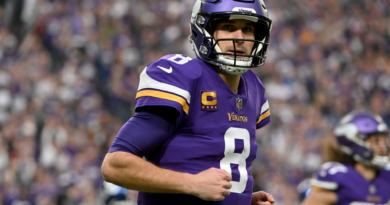Why Justin Jefferson's contract extension was a no-brainer despite the long wait
EAGAN, Minn. — The weirdest thing that happened on the way to Justin Jefferson‘s four-year, $140 million contract extension ($110 million guaranteed) with the Minnesota Vikings that he agreed to Monday: It took more than a year to negotiate and was complicated, so there emerged an absurd level of public discussion on the wisdom of signing him at all.
Jefferson isn’t a quarterback but wants quarterback money, as one popular refrain went.
There was much more.
He took two months to return from a hamstring injury last season, during which the Vikings recorded a much better record without him (5-2) than with him (2-8).
The draft seems to provide a handful of elite-level receivers every year.
There’s no reason to pay a premium salary to a wide receiver when there isn’t a proven quarterback on the roster.
He has made some iconic catches and racked up yardage at a historic level, but so did people like Julio Jones and DeAndre Hopkins before their careers stalled out.
So let’s be clear, once and for all, about what happened here.
The Vikings locked up the prime years of a player who has produced the best opening of a career of anyone at his position in the history of pro football. His average of 6.5 catches per game is the second highest of any receiver in his first four seasons, and his average of 98.3 yards per game is the highest in NFL history — for any career span. That puts Jefferson on a Hall of Fame track, and no definition of responsible team building can justify parting ways with a player who has put himself on a track to be one of the all-time greats.
Of course, there is a level of projection in that statement. But remember: Jefferson will be 25 years old when the season starts. There is a pretty low probability that his skills will fade before the expiration of this deal, and there is no better time for a team to make that bet than when its quarterback — eventually No. 10 overall pick J.J. McCarthy, in the Vikings’ case — is on a rookie contract with a controlled salary over at least the next three seasons.
In Minnesota, there is an understandable level of scar tissue from misplaced faith in wide receivers. Randy Moss played his way out of a job at age 27 and was traded in 2005. The same thing happened to Percy Harvin in 2013 at age 25 and later to Stefon Diggs in 2020 at age 27.
But the only commonalities they have with Jefferson is they play the same position and, with the exception of Diggs, were drafted in the first round. Jefferson has never produced a hint of an off-field concern, either inside or outside the building. His effort level and consistency are not in question. He supported the return of quarterback Kirk Cousins but pointedly stayed away from pressuring the team’s front office on its final decision.
The closest Jefferson has come to diva behavior is wearing sunglasses during interviews, which he once sheepishly attributed to an endorsement deal. He is a cultural icon in Minnesota, where kids — and adults — view his “Griddy” celebration as a part of the social fabric. There is no reason to think that his departure would have been addition by subtraction, even when accounting for the slew of draft picks he could have fetched if the Vikings had pursued a trade.
With this deal, however, Jefferson has now gone from a promising star to franchise cornerstone. As the Vikings navigate the transition from Cousins to Sam Darnold to McCarthy, they will rely on Jefferson not only for on-field production but to set a course in the locker room as well. Leadership in pro sports always falls to the team’s best players, and that means all eyes will be on Jefferson, whether he cultivates them or not.
There is, of course, no reason to think Jefferson isn’t up to it. His teammates elected him as a captain last year at age 24, and he immediately broke the ice with McCarthy with a text that ceded the nickname “J.J.”
“I go by ‘Jets,'” Jefferson wrote in the text, according to McCarthy.
Extending Jefferson’s contract was an expensive but easy decision. It was a no-brainer on every level. There was no reason to overthink it, and fortunately for them, the Vikings did not. It just took a while to get it done.




